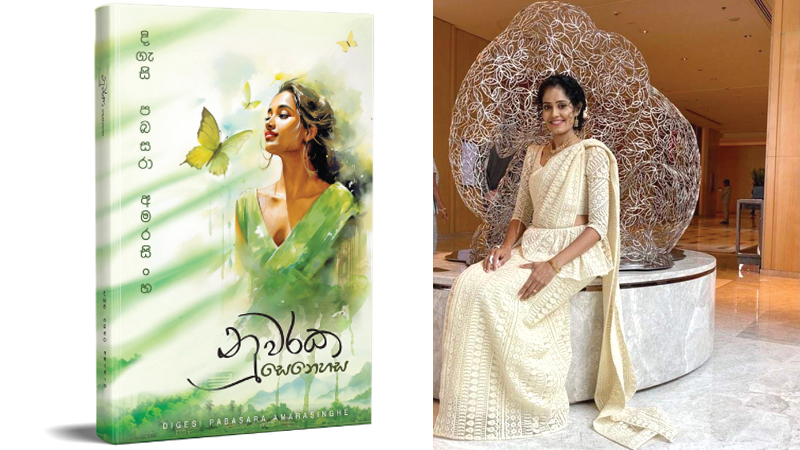Flawlessly set at a pastoral and rustic Sri Lankan landscape in Gampola, embedded with a basal plot and emerging failure of love and romance, “Nuwaraka Senehasa” – Digesi Pabasara Amarasingha’s debut novel is of a quiet introspection – an observation of its protagonist’s own mental and emotional processes. Digesi initiates the story with Miyasi, the protagonist, along with her colleague Radee, meeting Minuk at the Gampola railway station. The encounter is rather spontaneous and happens whilst Minuk was running hurriedly to catch the train; in the hustle and bustle at the railway station; the eyes of these two strangers are caught with each other.
Following several sunsets, Miyasi and Minuk developed an interest in each other and afterwards it blossomed into a romance. However, due to a wave of personal setbacks, their necessity of being together becomes fragile. Tying the knot is not a reality for Miyasi and Minuk instead, they find themselves being married to two different parties; Miyasi finds comfort with her husband who is an officer in the Navy while Radee, Miyasi’s friend finds her romantic shelter with Minuk.
Engulfed in a wave of influencing happenings, the story flows on towards the demise of Miyasi, soon following her labour. With an application of an unassuming style of writing in her debut, writer Digesi apparently challenges the conventions of accepted genres and clustered together for a quick confab. However, the writer simultaneously takes efforts in employing several sub genres that include romance, love, and her much inspired Sri Lankan literature.
Figurative language
The writer’s knack of applying a riveting and intriguing figurative language with conclusive and momentous encounters with the novel’s main characters hits the reader like a ton of bricks; it dispels any possible scepticism and qualms that a highly carping reader might come across and undisputedly it chronicles the relationship that the protagonist maintains with the other characters, running across the story.
The title of the book itself has congenitally got a conservative element in its form. A vivid reader would find the encounters that take place right throughout the flowing of the story more or less being encapsulated with a sense of gritty realism where realist American authors in the calibre of Upton Sinclair Jr. and John Steinbeck are reminded.
Digesi forms and frames pensive and reflective conversations between Miyasi and Minuk on love, affliction, and family values in a conventional Sri Lankan society together with characters that are noted for their sensible and pragmatic humanity.
Digesi’s impressive novel resembles her deftness in verse fable and lyric poetry; her enticing sharp and quick witted poetic and theoretical humour is on the finest splendour in her paragraphs; her subtle and imaginative ability in inventing verse fables is rather captivating. The breakthroughs and setbacks, engulfed with the lives of Miyasi and Minuk during the runup to the eventual demise of the former, bring out a classification of a thoroughgoing sense of glowing and evocative emotions; its illustration of preconceived notion, social hardships, and austerity, confronted by characters has got a fervent and poignant flow of unique identity.
Intensive flow
The novel’s standpoint evolves and starts transpiring just like a map whilst turning into different dimensions with the reader’s inquisitiveness being drawn into exquisitely driven pursuit of virtually concealed skeletons in the cupboard and the hush-hush of the protagonist. It could also be viewed as a form of a self-possession which is coeval with the execution of the avowal and demands of the era of the protagonist’s spring of love, love failure, despair, and misery. The novel is vaguely invested with the traits of an indirect meta-commentary on its very own amelioration. The story that flows is intense and racking whilst simultaneously showcasing the essence of lovey-dovey and passionate emotions.
To all appearances, writer Digesi brings out an indirectly meditative novel; Miyasi and Minuk are indelible and overwhelming portraits of anguish, regrets, failure of love and romance, surrounded by a landscape of miserable beauty. Digesi’s remarkability and excellence in poetry and prose give a significant degree of charm and elegance to the words that she crafts and bakes within the novel.
The novel is noted with a wave of querying as well as queering presumptions and assumptions, entailed with its characters and the relevant landscape. Digesi has sown the seeds of creative energy and freshness of style as well as a sporadically distinguished lyrical force in her artistic masterpiece that has got an atypical and aberrant combination of the characteristics of both heart and intellect. The novel is unique in its identity notably with regard to the writer’s ability of observation; the hipness of imagination and unassuming talent for narration.
The writer’s pungent power of thoughts, warmth, and strength in developing the plot from lofty idealism to realism characterise her writings. “Nuwaraka Senehasa” which will be launched on 21st October 2023 at the Library and Documentation Services Board of Sri Lanka would invariably find its space in an ardent reader’s wealthy bookshelf.






